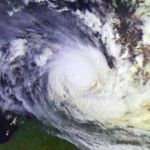1998–99 Australian region cyclone season
| 1998–99 Australian region cyclone season | |
|---|---|

Season summary map
|
|
| Seasonal boundaries | |
| First system formed | 7 October 1998 |
| Last system dissipated | 21 April 1999 |
| Strongest storm | |
| Name | Gwenda |
| • Maximum winds | 220 km/h (140 mph) (10-minute sustained) |
| • Lowest pressure | 900 hPa (mbar) |
| Seasonal statistics | |
| Tropical lows | 21 |
| Tropical cyclones | 14 official, 3 unofficial |
| Severe tropical cyclones | 9 |
| Total fatalities | 7 direct, 1 indirect |
| Total damage | $250 million (1999 USD) |
| Related articles | |
| Category 1 tropical cyclone (Australian scale) | |
| Tropical storm (SSHWS) | |
| Duration | 6 October – 10 October |
|---|---|
| Peak intensity | 75 km/h (45 mph) (10-min) 990 hPa (mbar) |
| Category 3 severe tropical cyclone (Australian scale) | |
| Category 1 tropical cyclone (SSHWS) | |
| Duration | 6 November – 13 November |
|---|---|
| Peak intensity | 150 km/h (90 mph) (10-min) 955 hPa (mbar) |
| Category 3 severe tropical cyclone (Australian scale) | |
| Category 1 tropical cyclone (SSHWS) | |
| Duration | 1 December – 7 December |
|---|---|
| Peak intensity | 130 km/h (80 mph) (10-min) 965 hPa (mbar) |
| Category 5 severe tropical cyclone (Australian scale) | |
| Category 4 tropical cyclone (SSHWS) | |
| Duration | 3 December – 15 December |
|---|---|
| Peak intensity | 220 km/h (140 mph) (10-min) 920 hPa (mbar) |
| Tropical low (Australian scale) | |
| Duration | 7 December – 13 December |
|---|---|
| Peak intensity | 45 km/h (30 mph) (10-min) 1000 hPa (mbar) |
| Category 2 tropical cyclone (Australian scale) | |
| Tropical storm (SSHWS) | |
| Duration | 22 December – 28 December |
|---|---|
| Peak intensity | 110 km/h (70 mph) (10-min) 975 hPa (mbar) |
| Tropical low (Australian scale) | |
| Duration | 26 December – 2 January |
|---|---|
| Peak intensity | 55 km/h (35 mph) (10-min) 996 hPa (mbar) |
| Category 1 tropical cyclone (Australian scale) | |
| Tropical storm (SSHWS) | |
| Duration | 20 January – 21 January |
|---|---|
| Peak intensity | 85 km/h (50 mph) (10-min) 987 hPa (mbar) |
| Category 3 severe tropical cyclone (Australian scale) | |
| Category 1 tropical cyclone (SSHWS) | |
| Duration | 21 January – 28 January |
|---|---|
| Peak intensity | 155 km/h (100 mph) (10-min) 950 hPa (mbar) |
The 1998–99 Australian region cyclone season was an above average tropical cyclone season that featured Gwenda, the most intense tropical cyclone in Australian Region (later tied with Inigo in 2003) . It began on 1 November 1998 and ended on 30 April 1999. The regional tropical cyclone operational plan also defines a tropical cyclone year separately from a tropical cyclone season, which runs from 1 July 1998 to 30 June 1999.
Tropical cyclones in this area are monitored by four Tropical Cyclone Warning Centres (TCWCs): the Australian Bureau of Meteorology in Perth, Darwin, and Brisbane; and TCWC Port Moresby in Papua New Guinea.
This storm developed near Cocos Island.
A tropical depression formed on 6 November 1998 near Cocos Island. The tropical depression rapidly strengthened into Tropical Cyclone Alison on the same day. Alison was 130 miles northeast of Cocos Island and was moving southeast.[1] Alison passed only 25 miles south of Cocos bringing gale force winds to the island. On 11 November, Alison encountered wind shear which weakened the storm and by 13 November the storm dissipated.[2]
Billy formed on 1 December 1998 off the northwestern Australia coast. The storm moved nearly due south before making landfall near Onslow, Western Australia.[3] Damage estimates from Australia are unavailable.
...
Wikipedia















